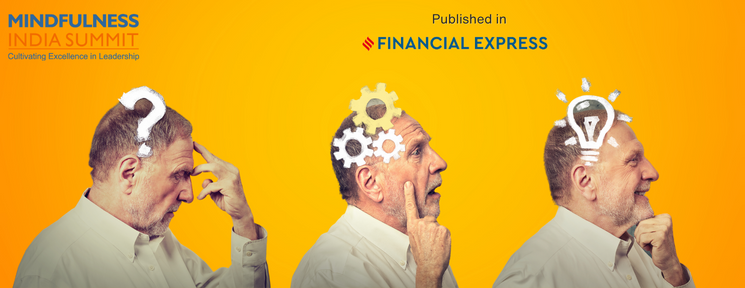Contact Form !

Mindfulness helps in building higher Emotional Intelligence
 Article Written by Manish Behl – A Global Authority on Mindfulness, Mental Health and Leadership
Article Written by Manish Behl – A Global Authority on Mindfulness, Mental Health and Leadership
Have you ever wondered why some people seem to have it all while others struggle to get ahead? Why do some people rise to the top of their fields while others remain stuck in mediocrity? Why do some people enjoy fulfilling relationships while others face loneliness and conflict?
We generally see in life that some people are more successful than others, even though they have fewer qualifications or resources available.
Think of two people who joined the same company at the same time. They had similar backgrounds and qualifications, but as time went by, one of them clearly outperformed the other. And everyone wondered: what was his secret?
The answer was not hard to find. The more successful one had something that the other one lacked: emotional intelligence. He had the ability to understand and manage his own emotions and those of others. This gave him an edge in communicating effectively, working well with people, making better decisions, and being more self-aware.
Although there are many factors that contribute to why some people are more successful than others, such as talent, hard work, luck, and opportunity, However, one factor that is often overlooked is emotional intelligence, which is the ability to understand and manage one’s own emotions and those of others.
Research has shown that people who are high in EI are more successful in many areas of life, including in the workplace, in relationships, and in their overall well-being. According to some studies, EQ can account for up to 58% of performance in all types of jobs and businesses. That means that EI can be more important than IQ, talent, or experience in determining your success and happiness
How does emotional intelligence work?
Emotional Intelligence is not just about being nice or sensitive; it’s about being smart with your feelings. People who have high EI can use their emotions to enhance their thinking, communication, and problem-solving skills.
One way that this plays a role in success is that it helps individuals build stronger relationships. People with high EI are better able to understand and empathize with the emotions of others, which can help them build trust, communicate more effectively, and collaborate more successfully.
In addition, EI can help individuals manage stress and overcome challenges. People with high EI are better able to regulate their own emotions, which can help them stay calm and focused in stressful situations and make more effective decisions
How is mindfulness linked to emotional intelligence?
During my conversation with Dr. Daniel Goleman, a renowned expert on emotional intelligence, at the world’s leading mindfulness and emotional intelligence conference ,Mindfulness India Summit, Manish Behl, in conversation with Dr. Daniel Goleman, discussed how mindfulness and emotional intelligence are closely related and how they can benefit us in our personal and professional lives.
He explained, Mindfulness practices are essential for self-awareness, which is an essential part of emotional intelligence, and the payoff is not only in being able to monitor what’s going on inside you and handle it better, but also in building an ability to be more composed, to be open to the other person or to the situation, and to stay focused on your goals authentically and with a positive attitude.”
We spoke about science behind mindfulness and the reasons for success of Mindfulness in modern world. With multiple stressors and distractions, its easier to get caught up, Mindfulness practices allow us to take pause and respond to situations.
He also shared Mindfulness tools and practices that can be included for in our day to day life.
Its always a pleasure and honour to speak to Dr Ronald Siegel where he shares his knowledge and insight on Mindfulness and ways to include it in our daily life.
Mindfulness: The Hidden Power of Awareness
Let me give you an example of how mindfulness can help you in a challenging situation. Suppose you are in a meeting with your boss and your team, and your boss criticizes your work harshly. How would you feel? How would you react?
In normal circumstances, you might react impulsively by arguing back, refusing to accept, denying the feedback, shutting down, or storming out of the meeting. These reactions could harm your image and your relationship with your boss and your team.
But if you are mindful, you could do something different. You could pause and notice your emotions without judging them. You could accept that you feel angry, hurt, or embarrassed, but also realize that these emotions are neither permanent nor personal. You could then calm yourself by taking a few deep breaths and responding in a more constructive way. For example, you could ask your boss for specific feedback on how to improve your work, thank him for his honesty, or express your disagreement respectfully. These responses could show your authenticity, genuineness, leadership skills, and emotional intelligence.
Researchers at the University of North Carolina found that mindfulness training can increase emotional intelligence. Managers who completed an 8-week mindfulness program showed significant improvements in emotional intelligence scores.
Why is mindfulness so powerful, and how does it work?
Based on my years of experience, I can assure you that mindfulness is one of the best ways to boost your emotional intelligence.
Based on my years of experience, I can assure you that mindfulness is one of the best ways to boost your emotional intelligence.
When we practice mindfulness, we learn to pay attention to the present moment and observe our thoughts and feelings without judgment or reaction and with kindness and curiosity. ” – Manish Behl
“Mindfulness is a powerful practice that helps you to cultivate a heightened awareness of your emotions, to understand and accept them better, and to handle them skillfully. It enables you to connect with others on a deeper level ”
Imagine being able to handle any emotion, in yourself or in others, with ease and confidence. That’s the key to personal and professional success. These skills can help you cope with challenging situations and communicate effectively with others.
Here’s how mindfulness can help unlock your emotional intelligence:
Increases self-awareness : By being present in the moment and tuning in to your thoughts, feelings, and bodily sensations, you can recognize patterns in your emotions and manage them more effectively.
Improves self-regulation : When you practice mindfulness, you learn to observe your emotions without getting caught up in them. This increased self-regulation can help you make more intentional choices about how you respond to emotional triggers.
Enhances Empathy : By becoming more attuned to the emotions of others, you can better understand and connect with them. With practice, you can tune in to the nonverbal cues and emotional states of those around you and respond with greater sensitivity and understanding.
Improves Social competence : By learning to regulate your own emotions in social situations, you can interact more effectively with others. With practise, you can develop better communication skills and respond appropriately to the emotions of those around you.
Insightful knowledge and the conscious practice of compassion, empathy, and self-awareness can foster an appreciation of human diversity.”- Manish Behl
In today’s VUCA world, it is easy to feel overwhelmed or stressed. Cultivating emotional intelligence is essential for personal growth and success, and one of the most powerful tools we have at our disposal is mindfulness. Mindfulness can be a game-changer when it comes to building emotional intelligence.
Dr. Jon Kabbat Zin has said, “We cannot control or stop the waves, but we can learn to surf on them with balance and ease.”
The good tidings
The good news is that emotional intelligence is not fixed and is trainable; you can improve it with practice and guidance, and mindfulness is the key factor that helps you cultivate higher emotional intelligence.
So, if you’re looking to strengthen your emotional intelligence, consider incorporating mindfulness into your daily routine. You can join mindfulness programs, and with practice, you can learn to be more present, more compassionate, and more in tune with your emotions, ultimately leading to a more fulfilling and joyful life.
This insightful article was written by the eminent Mindfulness and Emotional Expert, Manish Behl, and was originally featured in the esteemed News publication of the Financial Express
About the Writer: Manish Behl

A distinguished Mindfulness Teacher and a leading authority on Mindfulness and Emotional Intelligence. A TEDx speaker, neuroscience enthusiast, and certified Leadership Coach (ICF–PCC), Manish combines ancient Indian wisdom, and practical knowledge with scientific insights, making him a world’s leading voice on Mindfulness.
Write to him : hello@mindfulsciencecentre.com
Follow him on : Linkedin || Twitter || Instagram || Facebook
 A global premier event on Mindfulness happening on April 2024, Don’t miss this opportunity to shape our future and to learn the latest tools, insights, and practices of Mindfulness, Emotional Intelligence, and Neuroscience. Register Now
A global premier event on Mindfulness happening on April 2024, Don’t miss this opportunity to shape our future and to learn the latest tools, insights, and practices of Mindfulness, Emotional Intelligence, and Neuroscience. Register Now








